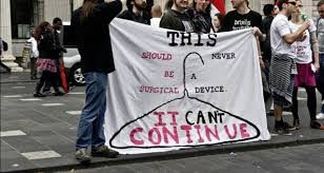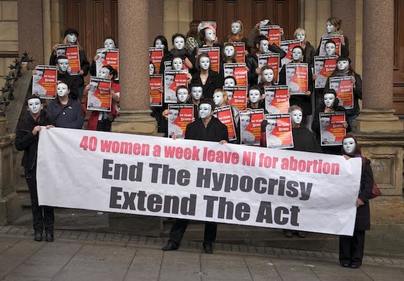 In a heartbreaking report seemingly out of the 19th century, the death of an Indian woman is described: Halappanavar, a 31-year-old Indian dentist who was 17 weeks pregnant, went to Galway University Hospital in 2012 with severe back pain. That same day, she and her husband were informed that she was miscarrying. But because a fetal heartbeat was still present, she was denied an abortion. Savita’s pain and condition got worse over the course of days, and still, her request for an abortion was denied. She died of septic shock, in pain and in a hospital that was fully equipped and able to save her life. Women are forced to travel to Britain to obtain a legal abortion up to 24 weeks of pregnancy governed by certain conditions. It is estimated that 5,000 Irish women travel abroad to access legal and safe abortion services. According to the website Irish Family Planning Association, women have the right to request information about abortion services in other countries from an Irish health care provider or crisis pregnancy counselor. Free pregnancy counseling and post abortion counseling, as well as post-abortion medical checks are government funded in Ireland, but not the actual procedure. Mara Clarke of the Abortion Support Network wrote in Reproductive and Sexual Heath and Justice in 2014 about the realities of the lack of legal abortion services in Ireland. The numbers show that the abortion rate in Ireland fell slightly in 2013, to 15.9 per 1,000 women, which was the lowest rate in 16 years. An analysis of the report was done by the British Pregnancy Advisory Service. The statistics, however, do not tell the entire story. It does not include the women who went to England and gave the address of a local friend or family member, the women who travel to other countries to access abortions, or the hundreds, if not thousands, of women who obtain early medical abortion pills online from Women on Web. “These numbers also do not capture the women who cannot travel—women who need but can’t get passports or visas to travel, women who can’t escape from violent partners, women who don’t have anyone who can watch their children while they travel, and women who do not have the £400 to £2,000 ($675 to $3,350) it costs to travel to England and pay privately for an abortion. If these women cannot access Women on Web, they are forced to choose between continuing the pregnancy anyway, or attempting to self-abort in much more dangerous ways,” Clarke reported. It is worth noting that abortion is free and provided by the National Health Service (NHS) in England, Scotland and Wales. She further emphasized the dividing line between rich and poor women. Women who are faced with an unplanned or unwanted pregnancy in Ireland do not have equal access. Women with money have options, and women without money have babies—or, in some cases, do dangerous and desperate things. But the divisions go beyond economic access to punitive political diffusiveness. Northern Ireland denied abortion services Northern Ireland residents are taxpaying citizens of the United Kingdom, but women in Northern Ireland are treated unfairly by their government and by the NHS. The 1967 Abortion Act was passed in the UK, but it was not extended to Northern Ireland. Women there have three options: have a baby, try to abort it yourself, or raise the £400-£2,000 cost to travel and pay privately for an abortion in England. Discrepancies in reporting Two reporting agencies cite conflicting statistics. The Department of Health in Ireland reports a decline in women traveling out of the country for an abortion, but the Abortion Support Network (ASN) reports an increase. The network is a grassroots charity that provides financial assistance, practical information on how to organize the least expensive abortion, and accommodation in volunteer homes for women traveling from Ireland to England. They have experienced a steep increase in calls from women in Ireland and Northern Ireland. For example in 2013, “ASN was contacted by 446 women and couples seeking support in order to access a safe and legal abortion; this is up from 363 in 2012 and 253 in 2011. We have heard from more than 250 in the first six months of 2014. Every day, ASN receives calls, texts, and emails from women and couples in Ireland and Northern Ireland,” they said. In addition to making the difficult and arduous decision on whether or not to terminate a pregnancy, women must also find the money to pay for the procedure, which can range from £330 to £1,350 ($550 to $2,250) depending on the stage of pregnancy, in addition to a mandatory consultation fee, a bus to the airport, plane tickets, a passport, child care, and other costs. It can be daunting to any women, let alone a woman living paycheck to paycheck or on limited income. Maintaining the right to choose and have control of her body is a woman’s basic right and should not be denied. Women’s rights groups are fighting for women’s social justice. Ireland’s Abortion Rights Campaign and Northern Ireland’s Alliance for Choice are fighting for law reform, while groups like Speaking of I.M.E.L.D.A (Ireland Making England the Legal Destination for Abortion) and Dublin Nights for Choice take less traditional approaches to raising public awareness and helping women access abortions. No matter what kind of approach is taken, the time is now to lift the ban on abortion for women in Ireland. Resources https://www.ifpa.ie/Pregnancy-Counselling/Abortion-Irish-Law http://rhrealitycheck.org/article/2014/06/13/irelands-abortion-laws-continue-harm-women/
5 Comments
Eileen
11/6/2015 11:47:09 am
Thanks Dava for another intersting report.
Reply
Dava Castillo
12/6/2015 01:09:08 pm
Thank you for reading and commenting Eileen.
Reply
eileen
12/6/2015 02:07:06 pm
We have to hope it will be sooner than that but sadly many people even in the west still oppose abortion
Hannha
12/6/2015 12:20:59 am
I am glad you put the spotlight on a very sad situation. In Ireland it is mostly the Catholic Church behind the law. It makes my blood boil because these pries,bishops and Pope make law about something they have no idea about it. The new Pope seems to be more down to earth as before the whole clergies could not bring out more pomp and dominations and lived a life of luxuries but demanded that everything is a sin just to keep the people down.
Reply
Dava Castillo
12/6/2015 01:11:04 pm
Thank you for reading and commenting Hannha.
Reply
Leave a Reply. |
Dava Castillo
is retired and lives in Clearlake, California. She has three grown
children and one grandson and a Bachelor’s degree in Health Services
Administration from St. Mary’s College in Moraga California. On the
home front Dava enjoys time with her family, reading, gardening, cooking
and sewing. Archives
November 2015
|


